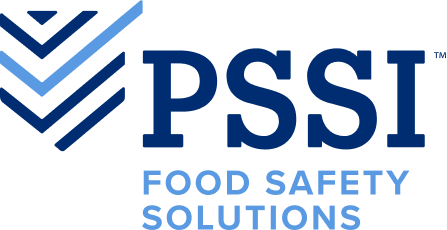While the additional rules and regulations continue to put pressure on businesses across the industry, the good news is that they seem to be having a positive impact. A recent report released by the FDA on the progress of the Food Safety Modernization Act (FSMA) following the launch of its new Food Safety Dashboard, reported that since 2016 the majority of companies inspected are in compliance with the new requirements. The report also demonstrates early results around the effectiveness of preventative measures as food recalls reached a five-year low.
Food safety success is at the heart of PSSI’s business and culture. While there is still a lot of work to do in the industry, we are proud to see progress being made. PSSI made a number of significant investments across key areas this year that we believe play a critical role in the on-going success across the industry. As we look forward to 2020 and beyond, our goal is to continue building on these key areas to boost protection and efficiencies for food processors and others across the food chain.
DATA/DOCUMENTATION
Data and documentation are the most critical components of managing a food safety program. While the majority of sanitation providers follow a 7-step process to document the proper cleaning process, PSSI felt there was a critical component missing related to documentation. So, we took it one step further and implemented our own 8-step sanitation process, including documentation as the eighth and final step. Keeping record of key KPIs during the sanitation process every night enables the PSSI sanitation site managers and our food safety teams to track consistency over time. This documentation also provides our partners with immediate visibility into the process and back-up documentation for compliance and auditor requirements.
PSSI also launched a new Real-Time Performance Metrics (RPM) platform to support more efficient collection, storage, visualization, and reporting of important sanitation data. The platform not only helps streamline data tracking and reporting needed from a compliance standpoint, but it enables our sanitors to proactively respond to any changes or concerns related to the sanitation process in real-time.
AUDIT PREP AND COMPLIANCE
Managing the ever-changing needs of new rules and regulations across the food processing industry is a difficult and demanding job – and unfortunately only going to become more difficult in the years ahead. In addition to the growing list of audit requirements from a governmental compliance standpoint, buyers and brands are now requiring their own separate third-party audits before making purchasing or partnership decisions.
That’s why PSSI built its own dedicated Field Audit & Support Team (F.A.S.T.) to serve as a value-added food safety executive oversight group for all PSSI partners. The F.A.S.T group is comprised of highly educated and expertly trained regulatory and technical experts, many of whom have lead food safety internally at some of the industry’s largest USDA, FDA and CFIA processing plants and food brands. The team consists of microbiologists, food safety specialists, GFSI auditors, regulatory compliance experts, who work together with individual sanitation teams across the country.
PSSI reported a 100 percent pass rate of more than 31 Global Food Safety Initiative (GFSI) audits it supported in October 2019, with 94 percent of the audits having no deficiencies associated with sanitation.
CHEMICAL INNOVATION
As new strains of aggressive pathogens continue to emerge, chemicals play a vital role in food safety management. The quality of the chemicals themselves, as well as the training related to chemical use and handling can have a significant impact on a food safety program and the safety of employees.
PSSI and its in-house sanitation partner, Packers Chemical, Inc. (PCI), are one of the only food safety providers to combine sanitation support and chemical products as part of one simplified and transparent pricing structure. This approach creates a consistent streamlined approach for plant managers, providing an enhanced level of protection and saving a significant amount of time and money in managing multiple budgets and vendor suppliers. It also provides plant managers with more visibility and control of the work being done to ensure food safety standards are met.
This year, PCI was one of the only companies across the industry to earn a Safe Quality Foods (SQF) Certification Level III Food Safety and Quality, verifying the quality and safety of its products.
SAFETY
In order to make progress in protecting the health and safety of consumers, the first step is protecting the health and safety of our food safety sanitation team behind the scenes.
The nature of the work with dangerous chemicals and large, complex machinery in loud, wet environments day in and day out presents hazards that need to be identified and training to work safely. Which is why it’s important to know that providers working inside of your facility value safety the same way your businesses do.
At PSSI safety is not only a priority, but a core value of our business. This year, our Safety Team of more than 60 people, including former OSHA compliance representatives, division safety managers and technical service experts across the country, implemented a new data driven approach. PSSI began collecting and analyzing data from thousands of food processing plants across the country to determine the root cause of safety issues to develop specific plans for how to minimize exposure in focused areas.
As part of the focused initiative, PSSI reported a 26.4 percent reduction in severe injuries and 39 percent reduction in OSHA recordable rate since 2018.
PSSI also kicked off a joint safety initiative with one of the industry’s largest food processors focused on conveyor risk injuries for food processing and sanitation employees. PSSI’s team of safety and sanitary design experts are leading comprehensive safety evaluations at the targeted locations. The team is helping to identify both operational and sanitary risks to determine how new engineering controls can help reduce exposure for processing and sanitation workers.
FOOD SAFETY
Food Safety is both an art and a science, that requires specific microbiological, chemical, safety and technical design expertise to identify potential risks or hazards in each unique environment. With so many different variables in today’s processing environments and dangerous microbial risks, a one-size fits all sanitation plan just doesn’t cut it anymore.
PSSI has the largest dedicated Food Safety team of highly trained experts across the country focused on designing custom sanitation programs based on the needs of each individual facility. PSSI’s growing Food Safety team not only works with various teams to develop the sanitary design plans, but also helps to monitor and manage it on a consistent day-to-day or even hour-to-hour basis to mitigate any potential issues that could threaten the overall effectiveness of the sanitation process.
We are proud of the progress made in 2019 and look forward to an even more successful year in 2020. As the industry’s leading food safety and sanitation provider, PSSI is dedicated to delivering a superior level of protection for our partners and finding new ways to continue innovating and advancing safety across the industry.

